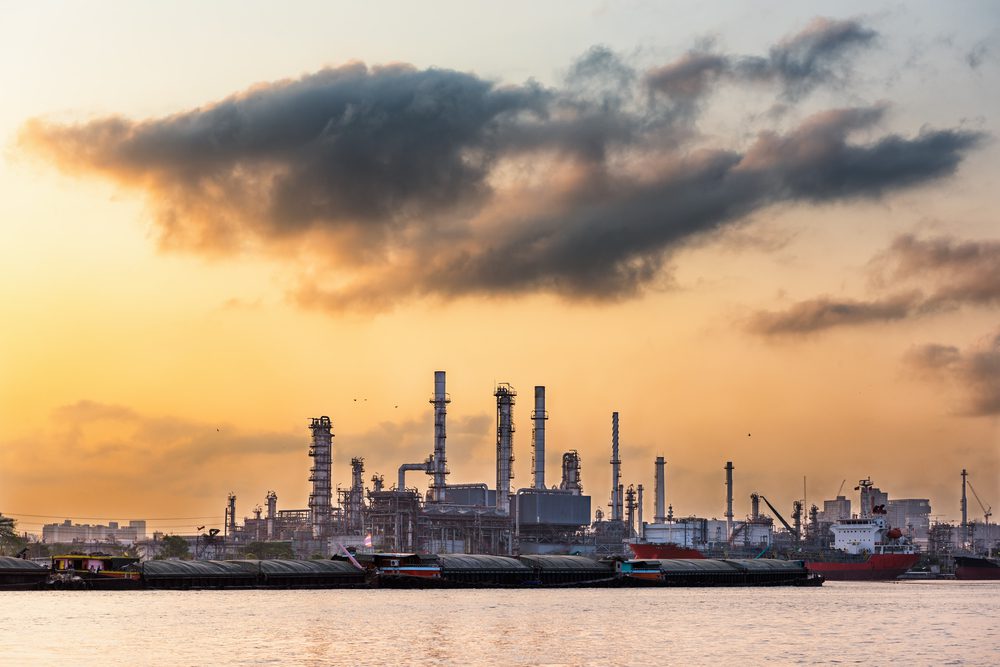Photo: By K.D.P. / Shutterstock
 Nov 20 (Reuters) – Global oil refiners have upgraded processing units and adjusted operations to raise output of low-sulfur residual fuels and marine gasoil (MGO) to prepare for stricter shipping fuel standards that kick in on Jan. 1, 2020.
Nov 20 (Reuters) – Global oil refiners have upgraded processing units and adjusted operations to raise output of low-sulfur residual fuels and marine gasoil (MGO) to prepare for stricter shipping fuel standards that kick in on Jan. 1, 2020.
The new International Maritime Organization (IMO) rules prohibit ships from using fuels containing more than 0.5% sulfur, compared with 3.5% through the end of December, unless they are equipped with exhaust-cleaning “scrubbers.”
The shipping industry consumes about 4 million barrels per day (bpd) of marine bunker fuels, and the rule changes will impact more than 50,000 merchant ships globally, opening a significant new market for fuel producers.
Below is a summary of how top refiners have prepared.
CHINA
The world’s largest refiner, Sinopec Corp , has started very low-sulfur fuel oil (VLSFO) output at 10 refineries in China, including Zhenhai Refining and Chemicals Co, Jinling Petrochemical Co and Hainan Petrochemical Co.
The company plans total VLSFO capacity of 10 million tonnes a year (about 180,000 bpd) by 2020.
It also plans to build a fleet of 100 barges over the next three years to supply cleaner fuels to ships.
PetroChina has pledged 4 million tonnes of VLSFO in 2020, likely from its Jinzhou, Jinxi and Dalian refineries in China’s northeast, and Guangxi refinery in the south.
PetroChina Fuel Oil Co Ltd has a license to supply ship fuel in Zhoushan on China’s east coast. Total plans to supply marine fuel in Zhoushan in a joint venture with China’s Zhejiang Energy.
China Marine Bunker, known as Chimbusco, secured at least 4 million tonnes of VLSFO for the fourth quarter of 2019 and the first two quarters of 2020, and has started to supply all major Chinese ports from bonded storage.
NORTH ASIA
Top South Korean refiner SK Energy, a unit of SK Innovation , started supplying MGO from October. It can produce up to 27,000 bpd of marine gasoil, about 8% of its total gasoil output.
SK is also building a vacuum residue desulphurisation (VRDS) unit that can produce 40,000 bpd of LSFO* due online in March or April 2020.
Its affiliate SK Trading International has signed six-month contracts with some shippers to supply VLSFO from the fourth quarter.
Hyundai Oilbank has said it will sell VLSFO from November.
In Japan, Fuji Oil Co Ltd, Cosmo Energy Holdings Co Ltd and Idemitsu Kosan Co Ltd began shipping IMO-compliant fuels in October.
Idemitsu is shipping IMO-compliant fuel from five locations and plans another site from December, its spokesman said.
SINGAPORE/SOUTHEAST ASIA
In the world’s largest marine fuels market, Royal Dutch Shell loaded its first LSFO cargo from its Pulau Bukom refinery in September, and Singapore Refining Company (SRC), a joint venture of Chevron Corp and Singapore Petroleum Co , supplied its first VLSFO cargo in October.
Chevron said its VLSFO and MGO supply capacity in Asia could double in the next one to two years.
Elsewhere in Asia, Vitol is building a 30,000 bpd crude processing unit in Malaysia to supply LSFO starting in May 2020, and IRPC Pcl said it will produce 52,000 tonnes of VLSFO in November, making it Thailand’s first refinery to produce IMO-compliant fuel.
Indian Oil Corporation Ltd has started supplying IMO-compliant fuel in India.
MIDDLE EAST
Uniper Energy DMCC operates two crude processing units in Fujairah that annually produce 3.6 million tonnes of VLSFO, including 0.1% sulfur fuel used in regional Emission Control Areas.
Brooge Petroleum and Gas Investment Co (BPGIC) said it plans a 250,000-bpd refinery in Fujairah to produce low-sulfur fuel.
Qatar Petroleum said in October it has started supplying VLSFO at its ports.
EUROPE
Marine fuel supplier Peninsula Petroleum plans to double VLSFO deliveries to 600,000 tonnes by year-end in Europe and the Americas.
Gunvor Group will overhaul its refinery in Rotterdam in March to produce LSFO.
UNITED STATES
Most U.S. Gulf Coast refiners are able to process heavy crudes used to make IMO-compliant marine fuels, and have spent heavily this year refurbishing distillation units and cokers to process cheaper, heavy grades.
Motiva Enterprises overhauled its Port Arthur, Texas, refinery, the nation’s largest, this year so it can produce compliant fuels. This month, PBF Energy, restarted a coker at its Chalmette, Louisiana, refinery that had been idled nine years.
Some U.S. refiners have also been importing high-sulfur fuel oil to turn into cleaner refined products for sale worldwide, as fuel oil hit a three-year seasonal low.
*LSFO stands for fuel oil with sulfur content of between 0.5% and 1.0%; VLSFO for fuel oil with a sulfur content of less than or equal to 0.5%; and ultra low-sulfur fuel oil (ULSFO) for fuel oil with sulfur content of less than or equal to 0.1%. Refineries that lack the technology to product VLSFO outright, may produce LSFO and blend it down to IMO-compliant levels. See the table at for more information.
(1 tonne of fuel oil is about 6.31-6.9 barrels, depending on the fuel’s relative density)
(Reporting by Chen Aizhu, Koustav Samanta and Roslan Khasawneh in Singapore, Yuka Obayashi in Tokyo, Jane Chung in Seoul, Chayut Setboonsarng in Bangkok and Erwin Seba in Houston; Editing by Florence Tan and Tom Hogue)
(c) Copyright Thomson Reuters 2019.

 Join The Club
Join The Club











